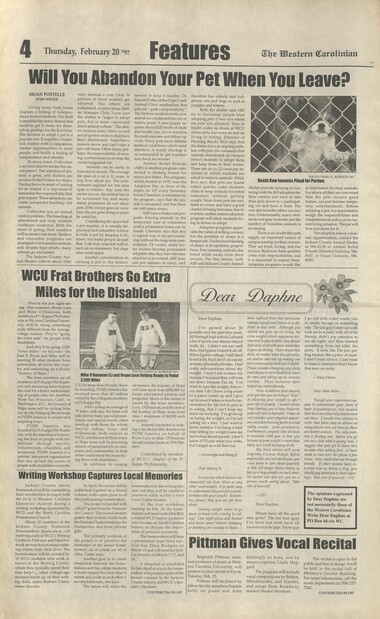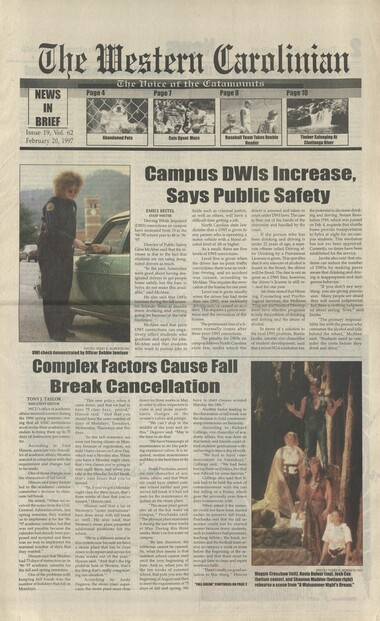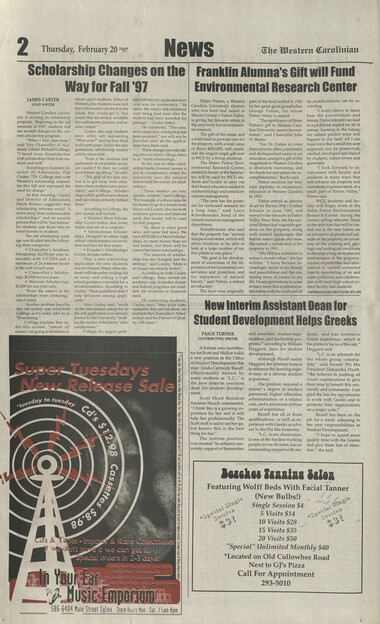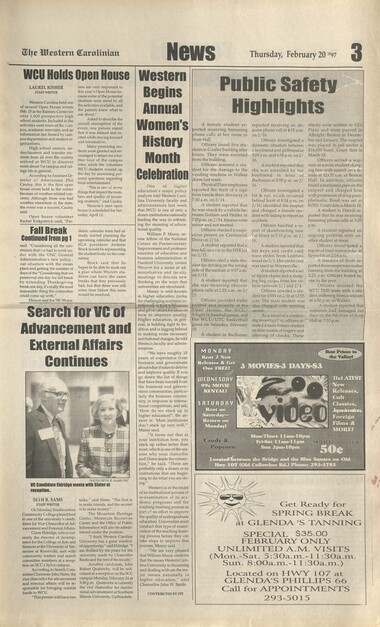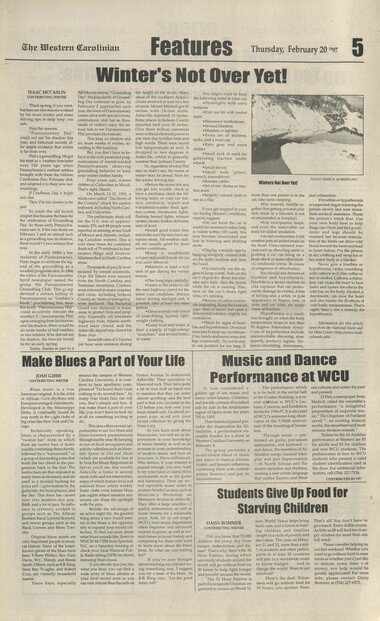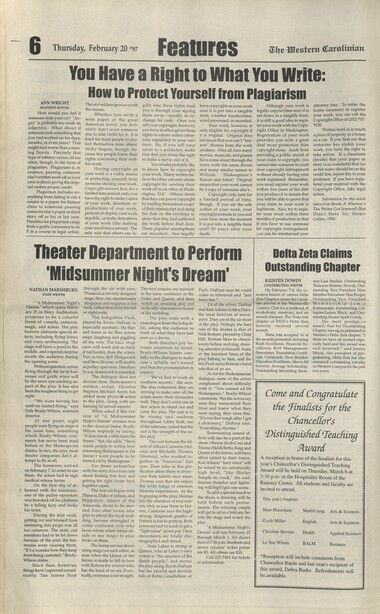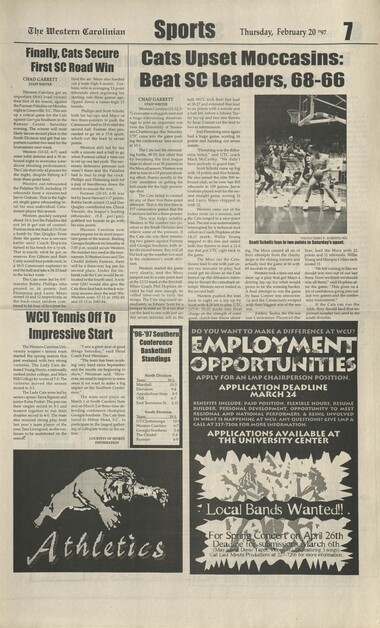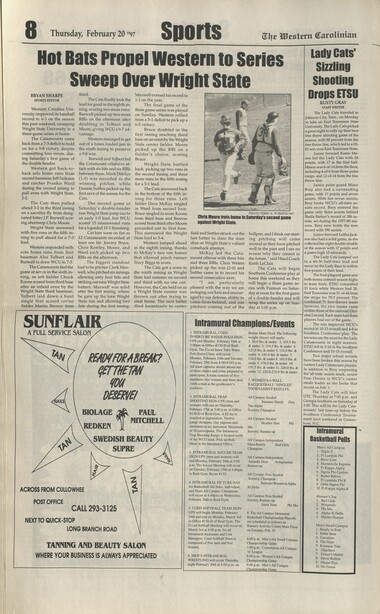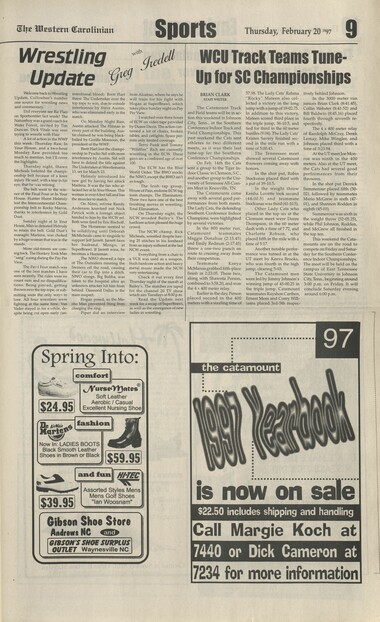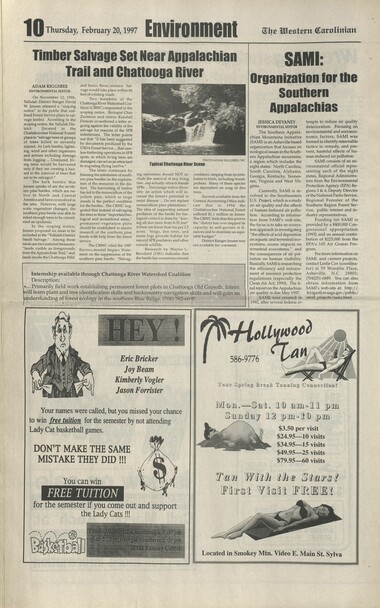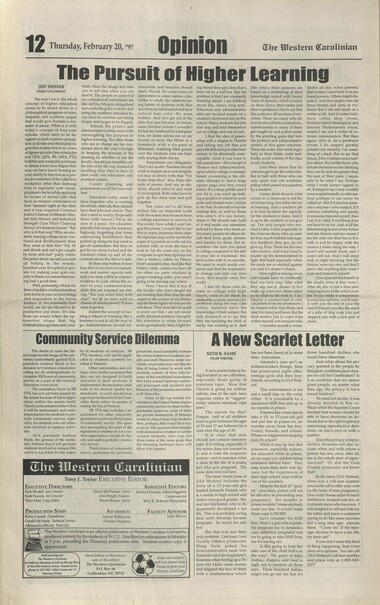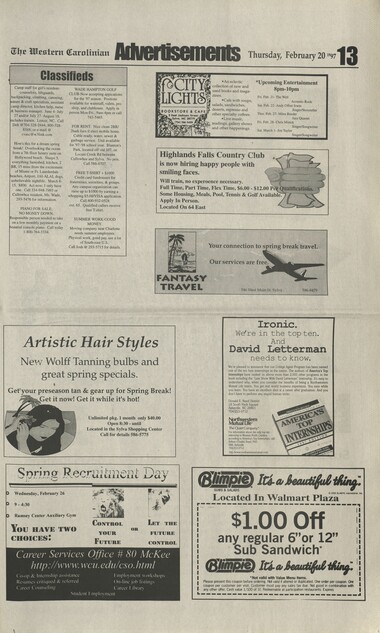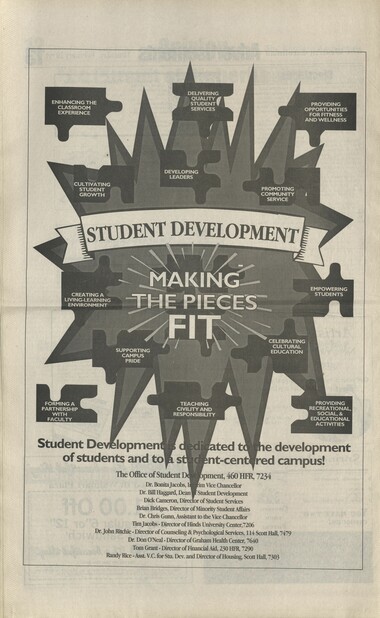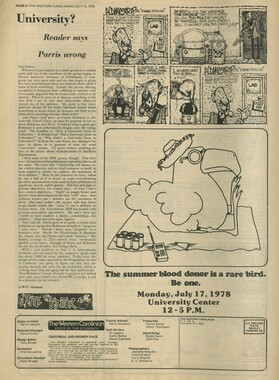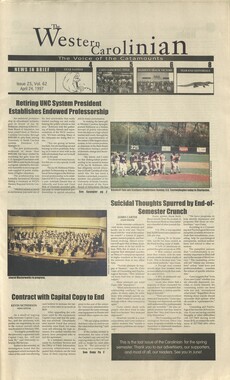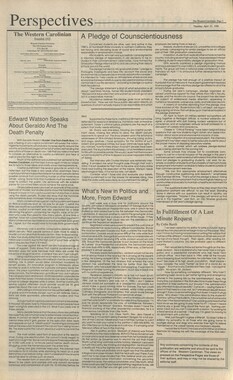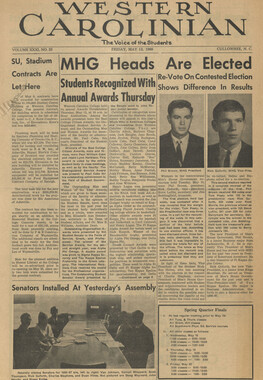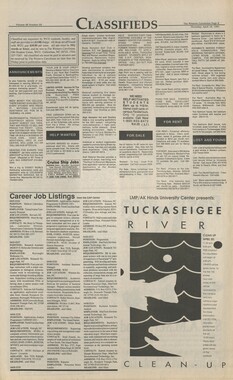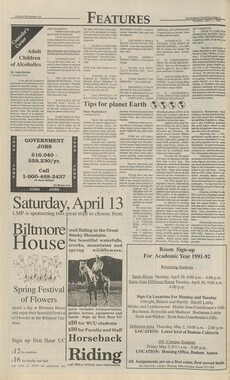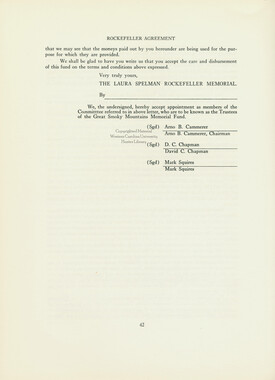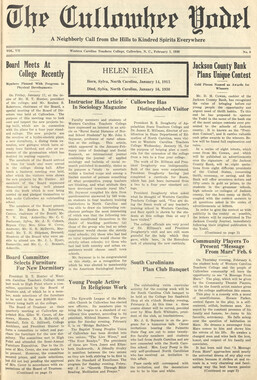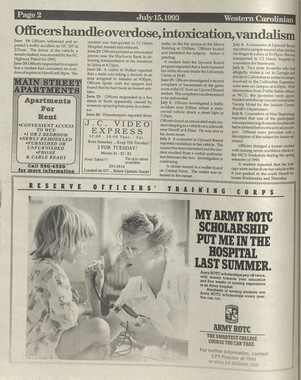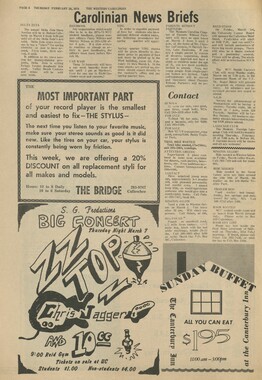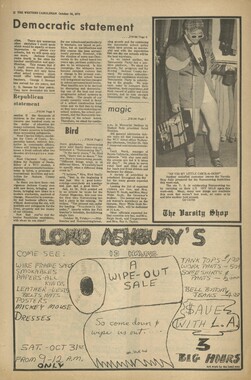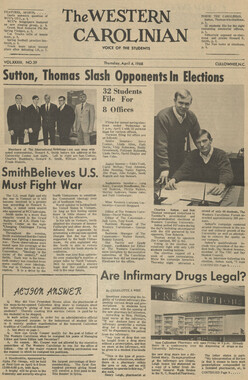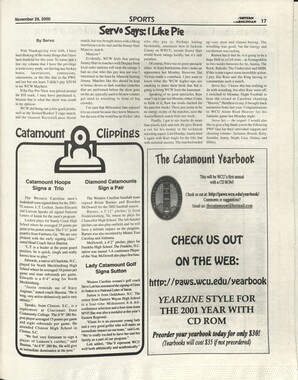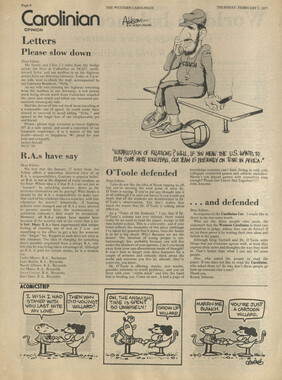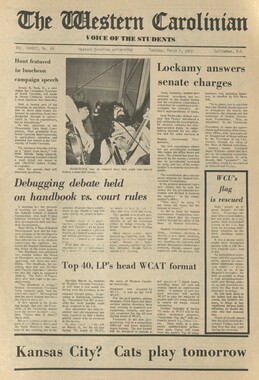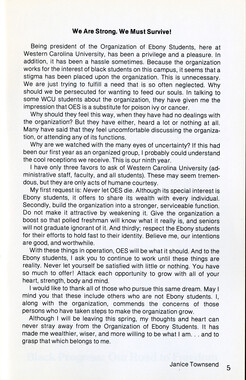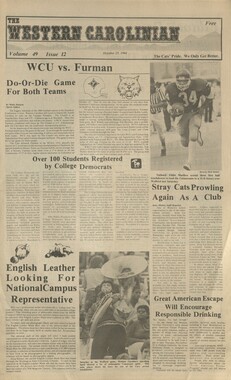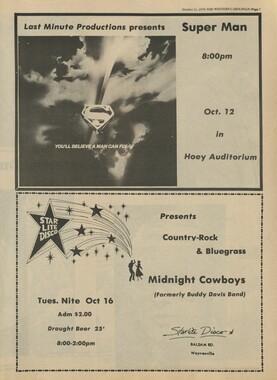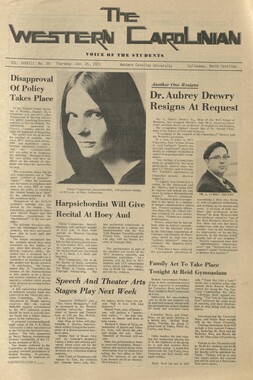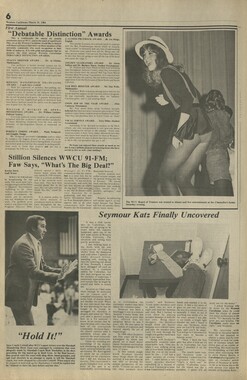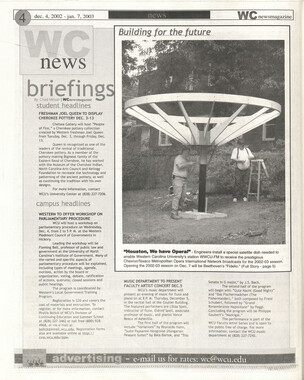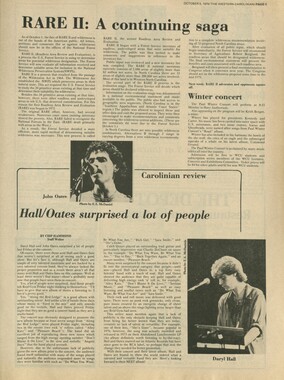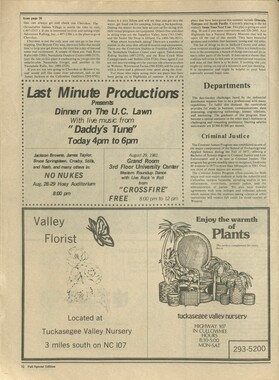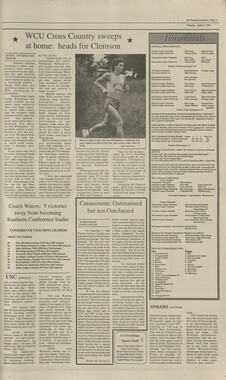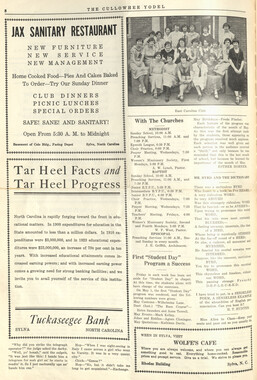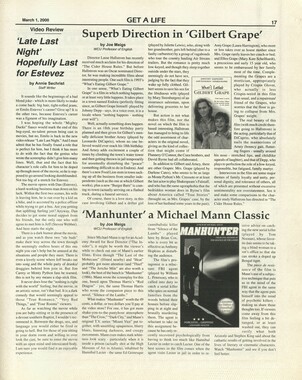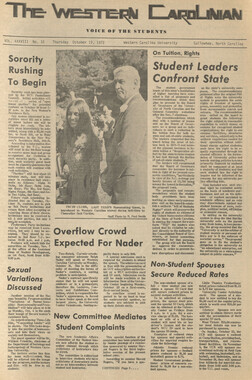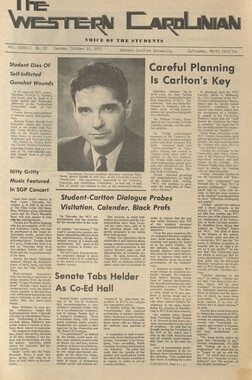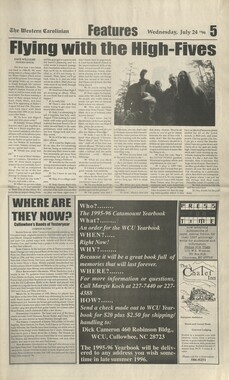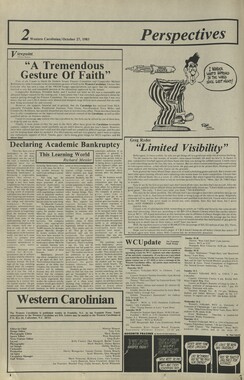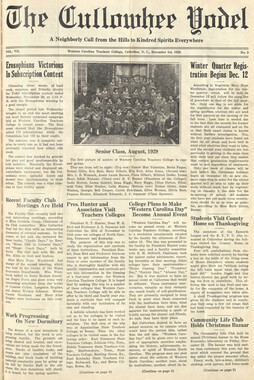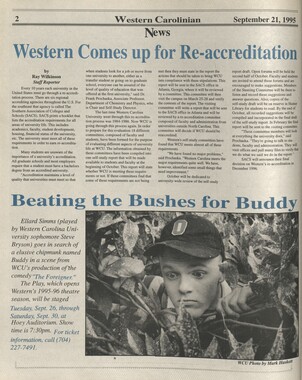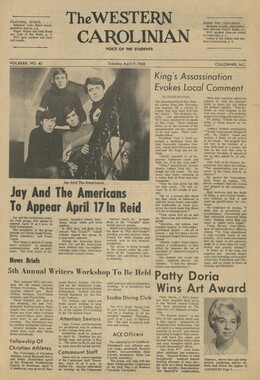Western Carolina University (20)
View all
- Canton Champion Fibre Company (2308)
- Cherokee Traditions (293)
- Civil War in Southern Appalachia (165)
- Craft Revival (1942)
- Great Smoky Mountains - A Park for America (2767)
- Highlights from Western Carolina University (430)
- Horace Kephart (941)
- Journeys Through Jackson (154)
- LGBTQIA+ Archive of Jackson County (24)
- Oral Histories of Western North Carolina (314)
- Picturing Appalachia (6772)
- Stories of Mountain Folk (413)
- Travel Western North Carolina (160)
- Western Carolina University Fine Art Museum Vitreograph Collection (129)
- Western Carolina University Herbarium (92)
- Western Carolina University: Making Memories (708)
- Western Carolina University Publications (2283)
- Western Carolina University Restricted Electronic Theses and Dissertations (146)
- Western North Carolina Regional Maps (71)
- World War II in Southern Appalachia (131)
University of North Carolina Asheville (6)
View all
- Allanstand Cottage Industries (62)
- Appalachian National Park Association (53)
- Bennett, Kelly, 1890-1974 (1388)
- Berry, Walter (76)
- Brasstown Carvers (40)
- Carver, George Washington, 1864?-1943 (26)
- Cathey, Joseph, 1803-1874 (1)
- Champion Fibre Company (233)
- Champion Paper and Fibre Company (297)
- Cherokee Indian Fair Association (16)
- Cherokee Language Program (22)
- Crowe, Amanda (40)
- Edmonston, Thomas Benton, 1842-1907 (7)
- Ensley, A. L. (Abraham Lincoln), 1865-1948 (275)
- Fromer, Irving Rhodes, 1913-1994 (70)
- George Butz (BFS 1907) (46)
- Goodrich, Frances Louisa (120)
- Grant, George Alexander, 1891-1964 (96)
- Heard, Marian Gladys (60)
- Kephart, Calvin, 1883-1969 (15)
- Kephart, Horace, 1862-1931 (313)
- Kephart, Laura, 1862-1954 (39)
- Laney, Gideon Thomas, 1889-1976 (439)
- Masa, George, 1881-1933 (61)
- McElhinney, William Julian, 1896-1953 (44)
- Niggli, Josephina, 1910-1983 (10)
- North Carolina Park Commission (105)
- Osborne, Kezia Stradley (9)
- Owens, Samuel Robert, 1918-1995 (11)
- Penland Weavers and Potters (36)
- Roberts, Vivienne (15)
- Roth, Albert, 1890-1974 (142)
- Schenck, Carl Alwin, 1868-1955 (1)
- Sherrill's Photography Studio (2565)
- Southern Highland Handicraft Guild (127)
- Southern Highlanders, Inc. (71)
- Stalcup, Jesse Bryson (46)
- Stearns, I. K. (213)
- Thompson, James Edward, 1880-1976 (226)
- United States. Indian Arts and Crafts Board (130)
- USFS (683)
- Vance, Zebulon Baird, 1830-1894 (1)
- Weaver, Zebulon, 1872-1948 (58)
- Western Carolina College (230)
- Western Carolina Teachers College (282)
- Western Carolina University (1794)
- Western Carolina University. Mountain Heritage Center (18)
- Whitman, Walt, 1819-1892 (10)
- Wilburn, Hiram Coleman, 1880-1967 (73)
- Williams, Isadora (3)
- Cain, Doreyl Ammons (0)
- Crittenden, Lorraine (0)
- Rhodes, Judy (0)
- Smith, Edward Clark (0)
- Appalachian Region, Southern (2393)
- Asheville (N.C.) (1887)
- Avery County (N.C.) (26)
- Blount County (Tenn.) (161)
- Buncombe County (N.C.) (1664)
- Cherokee County (N.C.) (283)
- Clay County (N.C.) (555)
- Graham County (N.C.) (233)
- Great Smoky Mountains National Park (N.C. and Tenn.) (478)
- Haywood County (N.C.) (3522)
- Henderson County (N.C.) (70)
- Jackson County (N.C.) (4692)
- Knox County (Tenn.) (25)
- Knoxville (Tenn.) (12)
- Lake Santeetlah (N.C.) (10)
- Macon County (N.C.) (420)
- Madison County (N.C.) (211)
- McDowell County (N.C.) (39)
- Mitchell County (N.C.) (132)
- Polk County (N.C.) (35)
- Qualla Boundary (981)
- Rutherford County (N.C.) (76)
- Swain County (N.C.) (2113)
- Transylvania County (N.C.) (247)
- Watauga County (N.C.) (12)
- Waynesville (N.C.) (68)
- Yancey County (N.C.) (72)
- Aerial Photographs (3)
- Aerial Views (60)
- Albums (books) (4)
- Articles (1)
- Artifacts (object Genre) (228)
- Biography (general Genre) (2)
- Cards (information Artifacts) (38)
- Clippings (information Artifacts) (191)
- Crafts (art Genres) (622)
- Depictions (visual Works) (21)
- Design Drawings (1)
- Drawings (visual Works) (184)
- Envelopes (73)
- Facsimiles (reproductions) (1)
- Fiction (general Genre) (4)
- Financial Records (12)
- Fliers (printed Matter) (67)
- Glass Plate Negatives (381)
- Guidebooks (2)
- Internegatives (10)
- Interviews (811)
- Land Surveys (102)
- Letters (correspondence) (1013)
- Manuscripts (documents) (619)
- Maps (documents) (159)
- Memorandums (25)
- Minutes (administrative Records) (59)
- Negatives (photographs) (5835)
- Newsletters (1285)
- Newspapers (2)
- Occupation Currency (1)
- Paintings (visual Works) (1)
- Pen And Ink Drawings (1)
- Periodicals (193)
- Personal Narratives (7)
- Photographs (12975)
- Plans (maps) (1)
- Poetry (6)
- Portraits (1663)
- Postcards (329)
- Programs (documents) (151)
- Publications (documents) (2237)
- Questionnaires (65)
- Scrapbooks (282)
- Sheet Music (1)
- Slides (photographs) (402)
- Sound Recordings (796)
- Specimens (92)
- Speeches (documents) (15)
- Tintypes (photographs) (8)
- Transcripts (322)
- Video Recordings (physical Artifacts) (23)
- Vitreographs (129)
- Text Messages (0)
- A.L. Ensley Collection (275)
- Appalachian Industrial School Records (7)
- Appalachian National Park Association Records (336)
- Axley-Meroney Collection (2)
- Bayard Wootten Photograph Collection (20)
- Bethel Rural Community Organization Collection (7)
- Blumer Collection (5)
- C.W. Slagle Collection (20)
- Canton Area Historical Museum (2110)
- Carlos C. Campbell Collection (282)
- Cataloochee History Project (65)
- Cherokee Studies Collection (4)
- Daisy Dame Photograph Album (5)
- Daniel Boone VI Collection (1)
- Doris Ulmann Photograph Collection (112)
- Elizabeth H. Lasley Collection (1)
- Elizabeth Woolworth Szold Fleharty Collection (4)
- Frank Fry Collection (95)
- George Masa Collection (173)
- Gideon Laney Collection (452)
- Hazel Scarborough Collection (2)
- Hiram C. Wilburn Papers (28)
- Historic Photographs Collection (236)
- Horace Kephart Collection (861)
- Humbard Collection (33)
- Hunter and Weaver Families Collection (1)
- I. D. Blumenthal Collection (4)
- Isadora Williams Collection (4)
- Jesse Bryson Stalcup Collection (47)
- Jim Thompson Collection (224)
- John B. Battle Collection (7)
- John C. Campbell Folk School Records (80)
- John Parris Collection (6)
- Judaculla Rock project (2)
- Kelly Bennett Collection (1407)
- Love Family Papers (11)
- Major Wiley Parris Civil War Letters (3)
- Map Collection (12)
- McFee-Misemer Civil War Letters (34)
- Mountain Heritage Center Collection (4)
- Norburn - Robertson - Thomson Families Collection (44)
- Pauline Hood Collection (7)
- Pre-Guild Collection (2)
- Qualla Arts and Crafts Mutual Collection (12)
- R.A. Romanes Collection (681)
- Rosser H. Taylor Collection (1)
- Samuel Robert Owens Collection (94)
- Sara Madison Collection (144)
- Sherrill Studio Photo Collection (2558)
- Smoky Mountains Hiking Club Collection (616)
- Stories of Mountain Folk - Radio Programs (374)
- The Reporter, Western Carolina University (510)
- Venoy and Elizabeth Reed Collection (16)
- WCU Gender and Sexuality Oral History Project (32)
- WCU Mountain Heritage Center Oral Histories (25)
- WCU Oral History Collection - Mountain People, Mountain Lives (71)
- WCU Students Newspapers Collection (1744)
- Western North Carolina Tomorrow Black Oral History Project (69)
- William Williams Stringfield Collection (2)
- Zebulon Weaver Collection (109)
- African Americans (390)
- Appalachian Trail (35)
- Artisans (521)
- Cherokee art (84)
- Cherokee artists -- North Carolina (10)
- Cherokee language (21)
- Cherokee pottery (101)
- Cherokee women (208)
- Church buildings (167)
- Civilian Conservation Corps (U.S.) (110)
- College student newspapers and periodicals (1830)
- Dams (103)
- Dance (1023)
- Education (222)
- Floods (61)
- Folk music (1015)
- Forced removal, 1813-1903 (2)
- Forest conservation (220)
- Forests and forestry (917)
- Gender nonconformity (4)
- Great Smoky Mountains National Park (N.C. and Tenn.) (154)
- Hunting (38)
- Landscape photography (10)
- Logging (103)
- Maps (84)
- Mines and mineral resources (8)
- North Carolina -- Maps (18)
- Paper industry (38)
- Postcards (255)
- Pottery (135)
- Railroad trains (71)
- Rural electrification -- North Carolina, Western (3)
- School integration -- Southern States (2)
- Segregation -- North Carolina, Western (5)
- Slavery (5)
- Sports (452)
- Storytelling (245)
- Waterfalls -- Great Smoky Mountains (N.C. and Tenn.) (66)
- Weaving -- Appalachian Region, Southern (280)
- Wood-carving -- Appalachian Region, Southern (328)
- World War, 1939-1945 (173)
Western Carolinian Volume 62 Number 19
Item
Item’s are ‘child’ level descriptions to ‘parent’ objects, (e.g. one page of a whole book).
-
-
4 Thursday, February 201997 Features ©Ije latent (gtaroliman Will You Abandon Your Pet When You LeaveP BRIAN POSTELLE STAFF WRITER Living away from home inspires a feeling of independence in most students. The thrill is amplified by many choices that students get to make for themselves, perhaps for the first time. The decision to adopt a pet is a popular one. It supplies a homesick student with a companion, creates opportunities to meet people, and builds a feeling of independence and identity. In many ways, Cullowhee is an ideal place to tender this development. The selection of animals is great, and shelters are anxious to find homes for strays. During the excitement of looking for an animal, it is important to remember the responsibility that pets require. These adoptions can create unexpected hardships for animals. Cullowhee has an animal control problem. The breeding of abandoned and stray animals continues unabated. With the onset of spring, their numbers will increase even more. Shelters and relocation programs are swamped wilh homeless animals and, despite their efforts, many animals go unclaimed. The Jackson County Animal Shelter collects about 1500 stray animals a year. Only 30 percent of those animals get adopted. The others are euthanized, or put to sleep. Shelter Manager Chris Tyson says the shelter is "eager to adopt pets, but is more concerned about animal welfare." The shelter receives many litters as well as full-grown animals that have been abandoned. Sometimes owners move and can't take a pet with them. Other times, perhaps, the responsibility of owning a pet becomes more than the owner bargained for. Animals can be costly in time and in money. The average life span of a cat is 12 years. A dog lives about ten. The commitment required for this time span is intense. Any time the owner moves, the animal has to be accounted for, and many rental properties do not allow pets. If the owner goes on vacation, the pet goes along or must be cared for. Considering the space that a pet requires, it is usually impractical and unhealthy to have to hide a pet by keeping it indoors, but many people do just that. Cats may respond well to such an environment, but dogs often need space. Another consideration in owning a pet is the money needed to keep it healthy. Dr. Samuel Potter of the Cope Creek Animal Clinic emphasizes that pets are "quite a responsibility." The lifetime medical needs of an animal are condensed into ten or twelve years. A new puppy requires about $125 worth of shots and health care, not to mention the food expenses and follow-up visits. Many pets have lifetime medical conditions which need attention. A yearly checkup is recommended to get boosters and check for worms. Animal Relief Friends (ARF) is another program committed to finding homes for strays and litters. The program, which started in 1978, runs the Adoption Day in front of the Ingles on 107 every Saturday. Susan Clements, a volunteer for the program, says that the system is successful, but that there are still many strays. ARF runs a foster care program, leaving animals in the temporary care of volunteers until a permanent home can be found. Clements says that this is a good way to try pet ownership without the long-term commitment. Of course, many foster owners become permanent adopters after they have become attached to an animal. ARF does not put animals to sleep, and therefore has elderly and full- grown cats and dogs as well as puppies and kittens. Both the shelter and ARF try to discourage people from adopting pets if they live where no pets are allowed. Due to health codes no dorm at WCU allows pets, but some do end up living in hiding. Director of Housing Randy Rice says that the dorms have an ongoing problem with pets. He comments that animals abandoned on campus attract students to adopt them and keep them in their rooms. There are six to 12 cases per semester in which students are asked to remove animals. While Rice says that pets are found rather quickly, some students claim to keep animals for entire semesters without getting caught. Since dorm pets are confined to rooms and have a good chance of being homeless due to eviction, neither animal adoption program will allow students living in dorms to adopt. Adoption programs appreciate the value of willing owners, but the problem of strays is a deeper one. Unchecked breeding of strays is in epidemic proportions. Free-running animals also breed while away from their owners. For this reason, both ARF and Jackson County Animal msm S X > PHOTO TERRY K. ROBERTS/WC Death Row Inmates Plead for Pardon. Shelter provide spaying or neutering with the $50 adoption fee. New owners just have to take their pets down to a participating vet and have it done. The cost also includes rabies vaccination. Unfortunately, many owners do not spay or neuter, and the number of homeless animals is increasing. There is no doubt that pets supply an important source of companionship for their owners. They are loyal, loving, and fun to have. However, these qualities come with responsibilities, and it is important to respect them. Adoption programs would like to find homes for stray animals, but above all they are concerned that the pets receive good homes, not just become temporary entertainment. Before adopting a pet, it is important to weigh the responsibilities and commitment as well as your current living situation. The pet will love you more for it. For adoption info or volunteer opportunities, contact the Jackson County Animal Shelter at 586-6138 or Animal Relief Friends (Veronica Nicholas, 586- 5647, or Susan Clements, 586- 8045). WCU Frat Brothers Go Extra Miles for the Disabled They're not just sight-seeing. This summer, Bryan Luce and Mike O'Donovan, both members of Fi Kappa Phi Fraternity at Western Carolina University, will be doing something quite different from the average college student. They're "going the extra mile" for people with disabilities. And they'll be going 3,500 "extra miles" on bicycles! On June 8, Bryan and Mike will be meeting 58 other students from universities all across the country and embarking on a 63-day "Journey of Hope." The team members are all members of Pi Kappa Phi Fraternity and are joining forces to pave the road for a better understanding of people who are disabled. From San Francisco, Calif., to Washington, D.C., the Journey of Hope team will be cycling from city to city, bringing the message of PUSH America in unique and inspiring ways. PUSH America was founded by Pi Kappa Phi Fraternity with the intention of improving the lives of people with disabilities through service, volunteerism, education, and awareness. PUSH America is a private, non-profit organization that has served the needs of people with disabilities across the Mike O'Donovan (U and Bryan 3,500 Miles U.S. for more than 19 years. Since its founding, PUSH America has received more than $3 million raised by the collegiate members of Pi Kappa Phi. After cycling an average of 75 miles each day, the team will take part in many special presentations and special events, often meeting with those for whom they're riding. Luce and O'Donovan, both seniors at WCU, and the rest of the Journey of Hope team will be providing dozens of presentations on campuses and communities to help others understand the issues facing those with disabilities. In addition to raising PHOTO TERRY K. ROBERTS/WC Luce Getting Ready to Pedal awareness, the Journey of Hope will raise more than $300,000 for future educational projects and programs. Much of this money is raised by the team members. Luce, O'Donovan, and the rest of the Journey of Hope team must raise a minimum of $4,000 each to qualify. Anyone interested in making a tax-deductible donation to PUSH America on behalf of Bryan Luce or Mike O'Donovan should contact them at (704) 586- 0419. Contributed by members of WCU's chapter of the Pi Kappa Phi fraternity. Writing Workshop Captures Local Memories Jacksor' County senior homemakers will be committing their recollections to paper with the help of Western Carolina University students during a writing workshop sponsored by WCU and the North Carolina Humanities Council. About 20 members of the Jackson County Extension Homemakers Association vvill meet regularly at WCU's Writing Center in February and March to work on non-fiction essays relating events from their lives. The homemakers will be assisted by 13 WCU students who work as tutors at the Writing Center, where they typically spend their time helping, other college-age students brush up on their writing skills, states Barbara Carter, center diiector. In April, the essays will be published together in a bound volume, with copies given to all the participating homemakers. The project is funded with a $1,200 grant from the Humanities Council. The council awards grants that include funds from the National Endowment for the Humanities and from private gifts. The primary purpose of the project is to preserve the memories of the senior home- makers, all of whom are 60 or older, Carter says. Another goal is to create interaction between the home- makers and the college students to foster respect for each other's talents and pride in each other's accomplishments, she says. The tutors will assist the homemakers in the writing process, but they will be careful to preserve each writer's own voice, Carter assures. At the first workshop meeting on Feb. 24, the home- makers will meet with John Bell, a retired WCU history professor who focuses on North Carolina history, to discuss the importance of personal narratives. The homemakers will hear a presentation from Sylva novelist Sue Ellen Bridgers on March 10 and will meet for writing sessions on March 3,17, and 24. A reception is scheduled for late April at which the home- makers will present copies of the bound volumes to the Jackson County Library and WCU's Special Collections. CONTRIBUTED BY OPI Dear Daphne, I've gained about 30 pounds over the past two years. All through high school, I played a lot of sports and always stayed really fit. I didn't eat too well then, but I guess I burnt it all off. When I got to college, I still liked to eat a lot, but I don't do nearly as many physical activities. I feel really self-conscious about my weight. I won't ask women out because I'm scared they will turn me down because I'm fat. I've tried to lose the weight, but every time I do I have a big exam or a paper comes up and I give up because it takes so much concentration for me not to give in to eating, that I can't keep my mind on studying. I've given up on losing the weight, so I'm not asking for a diet. I just want to know whether I'm being a total loser letting my weight make me feel so bad about myself. I don't know if I'll care what you write, but I might as well find out. —Overweight and Hating It Dear Hating It, In a society which idolizes the emaciated (see Kate Moss or any other supermodel), it-is quite easy to understand why you feel uncomfortable with your iveight. Remember, please, that you are far from alone. Gaining weight seems to go hand-in-hand with coming to college. Late night pizza and Ramen and hours spent indoors studying or drinking are usually to blame. I have suffered from this particular malady myself and I know it is difficult to deal with. Although you should not give up on losing the extra weight (which may prove detrimental to your health), you should definitely stick with your resolution to give up dieting. I have found that diets, no matter what they promise, are useless and end up making one feel continuously tired and irritable. Please consider changing your daily food choices to more healthful, lower fat ones and taking up an exercise routine. These measures have helped me tremendously. Noio, to address your inquiry as to whether you are being a "loser" in allowing your weight to affect your life so greatly. I would refrain from labeling you a loser; however, your self-view is harmful. Please do not consider your physical appearance as a determining factor in what really counts: your personality. Furthermore, anyone xvho declines to associate with you or date you because of your iveight is more than likely not worth knowing at all. My final advice will seem very trite; it is true, though. Before anyone else can care about you, you must learn to care about yourself. A bad self-image shows nearly as fast as a large pimple on one's nose. No matter ivho you are, you are a person worth caring about. Take care of yourself. —DD Dear Daphne, Where have all the good men gone? The last four guys I've been out with have all turned out to be pigs. Every guy I go out with either wants you to stroke his ego or something else. The last guy I went out with took me to a party with all of his friends, didn't pay attention to me all night, and then wanted something from me after the party. It feels like I'm just getting treated like a piece of meat. I don't want advice, I just want to make a statement that I know that men are jerks. —Man Hater Dear Man Hater, Though your experiences appear to substantiate your claim of male disgustingness, rest assured that there are some very decent men out there. I xuould even venture to write that there may be almost as many decent men out there as there are decent women. The only problem is finding one. Before you go out on a date with a young man, I suggest that you get to know him in some other setting first. At least speak to him over the phone a few times. Also, check him out through friends. If other women have reported him as being a dog, you should pay attention to their warnings. Take care of yourself.—DD The opinions expressed by Dear Daphne are not necessarily those of the Western Carolinian. Write Dear Daphne at PO Box 66 c/o WC. Pittman Gives Vocal Recital Reginald Pittman, assistant professor of music at Western Carolina University, will present a voice recital at 8 p.m. Tuesday, Feb. 25. Pittman will be joined by fellow faculty members Frankie Kelly on piano and Alan Mattingly on horn, and by mezzo-soprano Linda Haggard. The program will include vocal compositions by Britten, Mendelssohn, and Handel, and songs from Broadway musical theater literature. The recital is open to the public and free of charge. It will be held in the recital hall of Western's Coulter Building. For more information, call the music department at (704) 227- 7242. CONTRIBUTED BY OPI
Object
Object’s are ‘parent’ level descriptions to ‘children’ items, (e.g. a book with pages).
-
The Western Carolinian is Western Carolina University's student-run newspaper. The paper was published as the Cullowhee Yodel from 1924 to 1931 before changing its name to The Western Carolinian in 1933.
-
